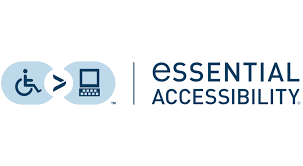Menu
Close
Accessibility
eSSENTIAL Accessibility
Many individuals have trouble typing, moving a mouse or reading a web page. They can’t access a website without assistive technology.
This icon ensures that a website is accessible to individuals with physical disabilities.

Organizations display this icon to certify that their site features a web-based assistive technology application from eSSENTIAL Accessibility™.
By clicking on the icon above, the user is redirected to www.essentialaccessibility.com where the application is available free of charge.
This application features an array of keyboard and mouse replacement solutions (alternative input methods including a webcam-based hands-free movement tracking system) that allow users to overcome any physical limitation to access our website. It also includes a web page reader.
The application can be rapidly downloaded and installed on a standard PC for the use of anyone who has difficulty typing, moving a mouse or reading a web page.
eSSENTIAL Accessibility™ benefits individuals with dexterity limitations that arise from a variety of conditions including:
- Stroke/paralysis
- Arthritis
- Multiple Sclerosis (MS)
- Cerebral Palsy (CP)
- Age-related factors
Moreover, it also helps those who have difficulty reading because of:
- Literacy deficiencies
- Limited English proficiency
- Dyslexia or similar learning issues
- Mild visual impairment
The Canadian Mental Health Association is proud to feature eSSENTIAL Accessibility™ as a Founding member of an Online Social ResponsAbility Initiative sponsored by March of Dimes Canada.